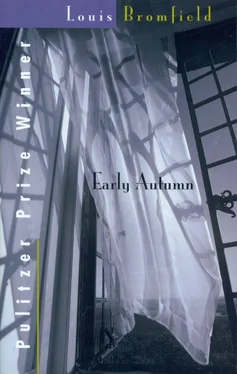If she had a rival in all the crowd that filled the echoing old house, it was Olivia Pentland—Sybil’s mother—who moved about, alone most of the time, watching her guests, acutely conscious that the ball was not all it should have been. There was about her nothing flamboyant and arresting, nothing which glittered with the worldly hardness of the green dress and the diamonds and burnished red hair of Sabine Callendar; she was, rather, a soft woman, of gentleness and poise, whose dark beauty conquered in a slower, more subtle fashion. You did not notice her at once among all the guests; you became aware of her slowly, as if her presence had the effect of stealing over you with the vagueness of a perfume. Suddenly you marked her from among all the others … with a sense of faint excitement … a pale white face, framed by smooth black hair drawn back low over the brows in a small knot at the back of her head. You noticed the clear, frank blue eyes, that in some lights seemed almost black, and most of all you noticed when she spoke that her voice was low, warm, and in a way irresistible, a voice with a hundred shades of color. She had a way, too, of laughing, when she was struck by the absurdity of something, that was like a child. One knew her at once for a great lady. It was impossible to believe that she was nearly forty and the mother of Sybil and a boy of fifteen.
Circumstance and a wisdom of her own had made of her a woman who seemed inactive and self-effacing. She had a manner of doing things effortlessly, with a great quietness, and yet, after one came to know her, one felt that she missed little which took place within sight or hearing—not only the obvious things which any stupid person might have noticed, but the subtle, indefinite currents which passed from one person to another. She possessed, it seemed, a marvelous gift for smoothing out troubles. A security, of the sort which often marks those who suffer from a too great awareness, enveloped and preceded her, turning to calm all the troubled world about her. Yet she was disturbing, too, in an odd, indefinable way. There was always a remoteness and a mystery, a sense almost of the fey. It was only after one had known her for a long time, enveloped in the quietness of her pleasant presence, that a faint sense of uneasiness was born. It would occur to you, with the surprise almost of a shock, that the woman you saw before you, the woman who was so gentle and serene, was not Olivia Pentland at all, but a kind of lay figure which concealed, far beneath the veneer of charm, a woman you did not know at all, who was remote and sad and perhaps lonely. In the end, she disturbed the person of discernment far more profoundly than the glittering, disagreeable Sabine Callendar.
In the midst of the noise and confusion of the ball, she had been moving about, now in this big room, now in that one, talking quietly to her guests, watching them, seeing that all went well; and, like all the others, she was fascinated at the spectacle of Sabine’s rebellion and triumph, perhaps even a little amused at the childishness of such defiance in a woman of forty-six who was clever, independent and even distinguished, who need not have troubled to flaunt her success.
Watching Sabine, whom she knew intimately enough, she had guessed that underneath the shell made so superbly by hairdresser, couturier and jeweler there lay hidden an awkward, red-haired little girl who was having her revenge now, walking roughshod over all the prejudices and traditions of such people as Aunt Cassie and John Pentland and Cousin Struthers Smallwood, D.D., whom Sabine always called “the Apostle to the Genteel.” It was almost, thought Olivia, as if Sabine, even after an exile of twenty years, was still afraid of them and that curious, undefeatable power which they represented.
But Sabine, she knew, was observing the party at the same time. She had watched her all the evening in the act of “absorbing” it; she knew that when Sabine walked across from Brook Cottage the next day, she would know everything that had happened at the ball, for she had a passion for inspecting life. Beneath the stony mask of indifference there boiled a perpetual and passionate interest in the intricacies of human affairs. Sabine herself had once described it as “the curse of analysis which took all the zest out of life.”
She was fond of Sabine as a creature unique in the realm of her experience, one who was amusing and actually made fetishes of truth and reality. She had a way of turning her intellect (for it was really a great intellect) upon some tangled, hopeless situation to dissolve it somehow into its proper elements and make it appear suddenly clear, uncomplicated and, more often than not, unpleasant; because the truth was not always a sweet and pleasant thing.
2
No one suffered more keenly from Sabine’s triumphant return than the invincible Aunt Cassie. In a way, she had always looked upon Sabine, even in the long years of her voluntary exile from the delights of Durham, as her own property, much as she might have looked upon a dog, if, indeed, the old lady had been able to bear the society of anything so untidy as a dog. Childless herself, she had exercised all her theories of upbringing upon the unfortunate orphaned little daughter of her husband’s brother.
At the moment, the old lady sat halfway down the white stairs, her sharp black eyes surveying the ball with a faint air of disapproval. The noisy music made her nervous and uneasy, and the way young girls had of using paint and powder seemed to her cheap and common. “One might as well brush one’s teeth at the dinner-table.” Secretly, she kept comparing everything with the ball given for herself forty years earlier, an event which had resulted at length in the capture of Mr. Struthers. Dressed economically (for she made it a point of honor to live on the income of her income), and in mourning for a husband dead eight years earlier, she resembled a dignified but slightly uneasy crow perched on a fence.
It was Sabine who observed that Aunt Cassie and her “lady companion,” Miss Peavey, sitting on the steps together, resembled a crow and a pouter pigeon. Miss Peavey was not only fat, she was actually bulbous—one of those women inclined by nature toward “flesh,” who would have been fat on a diet of sawdust and distilled water; and she had come into the family life thirty years earlier as a companion, a kind of slave, to divert Aunt Cassie during the long period of her invalidism. She had remained there ever since, taking the place of a husband who was dead and children who had never been born.
There was something childlike about Miss Peavey—some people said that she was not quite bright—but she suited Aunt Cassie to a T, for she was as submissive as a child and wholly dependent in a financial sense. Aunt Cassie even gave her enough to make up for the losses she incurred by keeping a small shop in Boston devoted to the sale of “artistic” pottery. Miss Peavey was a lady, and though penniless, was “well connected” in Boston. At sixty she had grown too heavy for her birdlike little feet and so took very little exercise. Tonight she was dressed in a very fancy gown covered with lace and sequins and passementerie, rather in the mode which someone had told her was her style in the far-off days of her girlhood. Her hair was streaked with gray and cut short in a shaggy, uneven fashion; not, however, because short hair was chic, but because she had cut it ten years before short hair had been heard of, in a sudden futile gesture of freedom at the terrible moment she made her one feeble attempt to escape Aunt Cassie and lead her own life. She had come back in the end, when her poor savings gave out and bankruptcy faced her, to be received by Aunt Cassie with dignified sighs and flutters as a returned and repentant prodigal. In this role she had lived ever since in a state of complete subjection. She was Aunt Cassie’s creature now, to go where Aunt Cassie ordered, to do as she was bid, to be an earpiece when there was at hand no one more worthy of address.
Читать дальше












